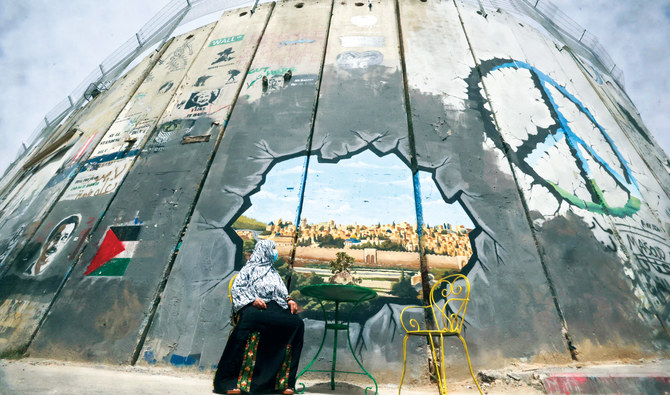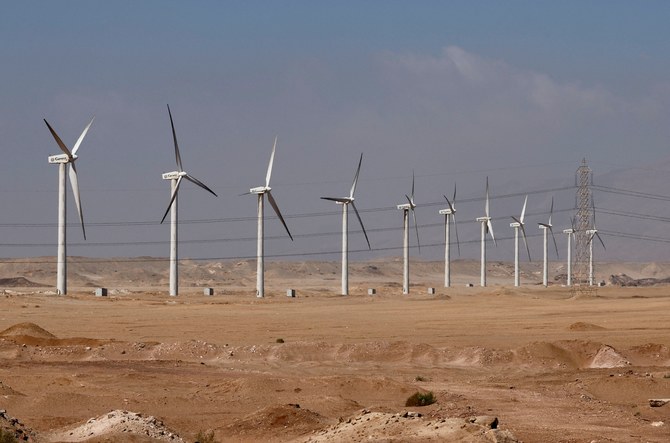
Mitsotakis made comments during the Middle East Green Initiative being held in Riyadh
Greek-Saudi ties have deepened in recent months in matters of defense, tourism and culture
RIYADH: Greek Prime Minister Kyriakos Mitsotakis said on Monday his country can be an entry point into the European power market for cheap electricity produced from solar sources in the Middle East.
Mitsotakis made his comments during the Middle East Green Initiative (MGI) Summit, which was being held in Riyadh, a gathering hosted by Crown Prince Mohammed bin Salman and attended by other world leaders.
The Greek prime minister will also attend the Future Investment Initiative in Saudi Arabia and will meet with the crown prince during his two-day visit to the Kingdom.
During the MGI Summit, Mitsotakis also said 32 billion euros ($37.1 billion) will be allocated for green projects in Greece over the next seven years, while a dedicated ministry will be launched to protect forests following the wild fires that hit the country last year.
Mohammed bin Salman unveiled the MGI in March, alongside its domestic counterpart, the Saudi Green Initiative, as pillars of the Kingdom’s efforts to reverse environmental degradation and climate change.
Part of the Kingdom’s Vision 2030 to reshape its economy, both initiatives provide an ambitious roadmap for Saudi Arabia and the region to meet worldwide emissions targets.
Greece, meanwhile, is also taking an active role in combating climate change, promoting “green diplomacy” both across the EU and the wider region.
The two countries have become close recently, sharing a common vision on stability in the Eastern Mediterranean and the Gulf.
Mitsotakis’ first visit to Saudi Arabia came in February 2020, a few months after he took over as prime minister. He also met with Saudi Foreign Minister Prince Faisal bin Farhan at the Philia Forum in Athens in February this year.
Bilateral ties have deepened particularly in the field of defense, with the deployment of a Greek Patriot anti-aircraft missile system, or PAC-2, to Saudi Arabia in September to boost the Kingdom’s role in combating Houthi rebels in Yemen.
In addition, 120 Greek soldiers are stationed in Saudi Arabia to operate it, while the PAC-2 is set to be upgraded to the PAC-3 system in due course. The heads of the countries’ joint general staffs have also developed close and frequent contacts.
“The deepening of Greek-Saudi relations is of strategic significance for both nations as well as for the entire Eastern Mediterranean-Middle East regional complex,” Prof. Michael Tanchum, senior fellow at the Austrian Institute for European and Security Policy and a non-resident fellow at the Middle East Institute in Washington, D.C., told Arab News.
“2021 has witnessed landmark events raising the level of the Greek-Saudi security partnership, notably Saudi Arabia’s first bilateral military exercise with Greece, ‘Eye of the Falcon 1,’ in March 2021, and the Kingdom’s participation in the September 2021 ‘Hercules 21’ exercises — the first multilateral joint military exercises between Greece, Egypt, the UAE and Saudi Arabia.
“In the absence of a convincing security guarantee from its European partners, Athens has skillfully developed its defense relations with Egypt, Israel, the UAE and Saudi Arabia, while engaging with select EU member states to achieve a sufficient deterrence capability,” he said.
“Athens similarly needs to deepen its economic relations with each of these countries to create a robust Mediterranean-Middle East commercial corridor … that can even extend from Israel and the Gulf states to India,” he added. “Raising the level of the Greek-Saudi business relationship, resulting in large-scale investments in each country, is the next step and is likely a high priority agenda item for Prime Minister Mitsotakis’ upcoming state visit to Saudi Arabia.”
Prof. Spyros Litsas from the University of Macedonia said: “The new official visit of the Greek premier … must be seen as another decisive step towards the construction of a strategic triangle of security and stability in the Arabian Gulf, with Athens, Riyadh and Abu Dhabi forming its related durable angles — especially after the signature of the mutual defense cooperation and assistance pact between Greece and the UAE, and the (deployment) of the Greek PAC-2 to Saudi Arabia.
“It goes without saying that the construction of this triangle of security and stability is of paramount importance for the dynamic deterrence of radical groups and revisionist states too in the post-COVID-19 era, while it also enhances the geostrategic role of Greece, Saudi Arabia and the UAE as regional pillars of smart defense and cooperation,” he added.
Bilateral ties, though, are not confined to defense, and are blossoming in tourism, culture and investment.
At a meeting on May 20, Saudi Arabia’s culture minister, Prince Badr bin Farhan, met the President of the Hellenic Republic Katerina Sakellaropoulou in Athens to discuss a memorandum on international cooperation in culture, which will be signed later this year in Riyadh.
In September, tourism, investment and trade topped the agenda of talks between Greek Minister of Tourism Vassilis Kikilias and Saudi Minister of Investment Khalid bin Abdulaziz Al-Fatih during the latter’s visit to the Greek capital. Al-Fatih also met with Greece’s investments and development minister, Adonis Georgiadis.












